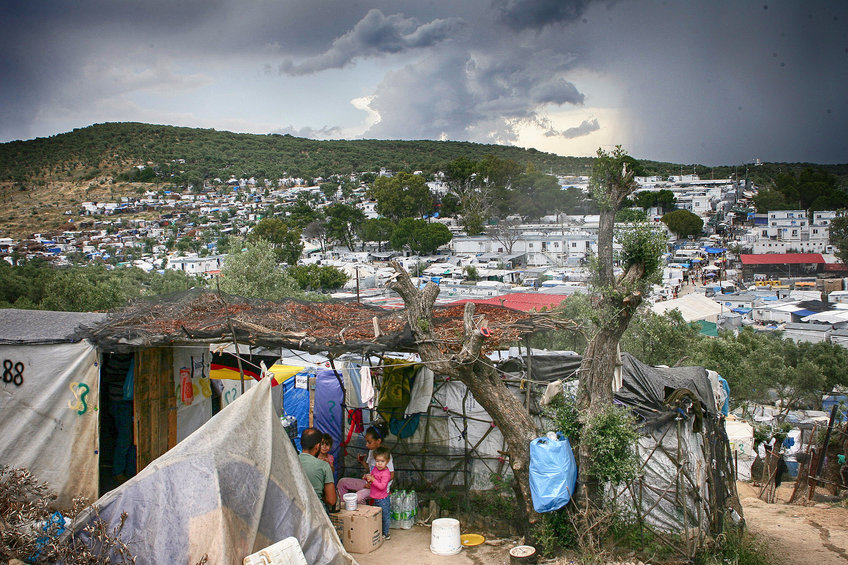Asylum facilities that violate laws
Conditions in Greek EU hotspots and German arrival centres violate fundamental rights and EU directives
It is now five years since Angela Merkel set the course in German migration policy with her statement "Wir schaffen das" ("We can handle this"). At that time, hundreds of thousands of refugees were seeking asylum in Germany and other European countries. Developments since then have become a focus of research. In the Max Planck Society, an interdisciplinary scientific initiative has been working on the challenges of migration, integration, and exclusion. As part of this initiative, two studies analysed the situation of people at the EU hotspots on the Greek islands and at the so-called AnkER facilities (arrival centres for asylum-seekers) in Germany. According to the findings of this research, both institutions are in breach of the fundamental rights of asylum-seekers.

When growing numbers of people were fleeing to Europe via the Mediterranean in 2015, the European Commission responded by setting up so-called “hotspots” in Italy and Greece. Refugees at these camps were to register near the external European border. These EU hotspots have since become permanent facilities. Since the EU-Turkey declaration in March 2016, the camps on the Greek islands have mainly served as deportation centres. Living conditions there are in breach of current EU law: the shelters are overcrowded, sanitary facilities and medical care do not meet EU standards and the people there are not protected from violence. In November 2019, the head of the European Union Agency for Fundamental Rights, Michael O'Flaherty, described the EU hotspot system in Greece as “by far the most worrying fundamental rights problem in the entire European Union”.
Unclear responsibilities in the hotspots
Catharina Ziebritzki of the Max Planck Institute for Comparative Public Law and International Law in Heidelberg and Robert Nestler of the Max Planck Institute for Social Anthropology in Halle have studied the management of EU hotspots. They conclude that the responsibilities of the various protagonists – EU agencies as well as national and local authorities – are not fully defined by law and are entirely unclear in practice. As long as responsibilities are not clearly defined, no one can be held legally responsible in court for the violations. “Clear-cut responsibilities for the asylum procedure and admission conditions as well as effective legal protection are a basic prerequisite for any form of preliminary review of an asylum application – and this applies equally at the EU’s external border,” says Catharina Ziebritzki. Otherwise, she says, the transfer of asylum applications to remote border regions would almost inevitably involve a breach of fundamental rights.
Some of these systemic weaknesses can also be observed at the so-called AnkER centres in Germany, which have been established since autumn 2018 as arrival centres for asylum-seekers, especially in Bavaria. This is the conclusion of a further study published by Tim Rohmann of the Max Planck Institute for Social Law and Social Policy in Munich and Miriam Schader of the Max Planck Institute for the Study of Religious and Ethnic Diversity in Göttingen.
Legal irregularities in arrival centres
The law provides that asylum seeker without children are required to reside in the centres for up to 18 months; previously, the maximum period was six months in the responsible reception centre. Initially, asylum seekers were not allowed to take up paid employment during this period of time, which goes against the EU Reception Directive, which stipulates that access to the labour market must be granted no later than nine months after the asylum application has been filed. This Directive was amended in August 2019. According to the findings of the study, there is also no sufficient guarantee that asylum seekers will receive legal assistance and asylum procedure advice as enshrined in the German constitution and in European law.
The study also casts doubt about whether the original goal of making asylum procedures at the AnkER centres more efficient can actually be achieved by means of accelerated procedures alone. “Maintaining basic standards and human rights is not an obstacle, but a prerequisite for lawful decisions and the efficiency of the German asylum system,”" says Tim Rohmann of the Max Planck Institute for Social Law and Social Policy in Munich. Other studies have shown that asylum procedure counselling makes a significant contribution to the overall understanding and acceptance of the procedure by those involved, thereby increasing efficiency.
Meeting standards could increase efficiency
The findings of the sociological part of the study also question the concept of AnkER centres. The people at the centres live in isolation from the outside world; at the same time they are housed in mass accommodation and have no privacy. As a result of the poor access to education and training, German language courses and employment, they often have no choice but to do nothing at all. “People at AnkER centres are barely able to prepare for life in Germany,” says Miriam Schader of the Max Planck Institute for the Study of Religious and Ethnic Diversity. She says that the isolation at the AnkER centres combined with the lack of privacy is difficult to endure and can be detrimental to mental health – especially for people who have already been traumatized. Not only are there legal arguments against the concept of the AnkER centres, they also fail to comply with integration policy.
Eva Völker
The Project
The Science Initiative Migration, launched by the Max Planck Society in 2017, brought together researchers from six Max Planck Institutes in Berlin, Göttingen, Halle, Heidelberg, Munich and Rostock for the first time. This interdisciplinary research network, which will be presenting its results this year, examined the factors influencing migration, integration and exclusion from the perspectives of anthropology, demography, epidemiology, ethnology, history, law, sociology and economics. In the coming weeks we will present four example projects. They will highlight the challenges confronting migration policy at various levels – from European to local – since Angela Merkel’s famous statement “We can handle this” of 2015.












